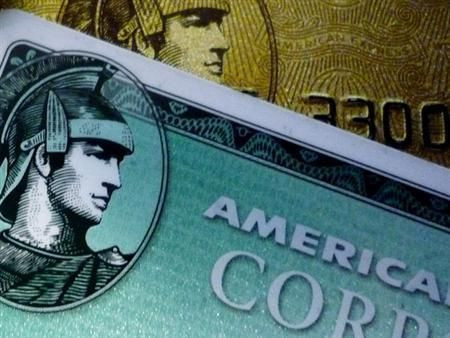Why Is American Express Partnering With Twitter?
Will financial services really "unlock the purchasing power of the #Hashtag?"

As emerging technologies expand into more areas of social and political life, the financial services industry is keenly keeping track of any potential disruptions that might alter or undermine its business. Companies making so-called “mobile wallets,” such as Jack Dorsey’s Square, promise to shake up our entire conception of “financial services” by vastly increasing the velocity of money. But by their very nature as emerging technologies, something like a mobile wallet has yet to show its true economic impact.
American Express (NYSE:AXP) took a bold step this week, when the 150-plus-year-old company announced it was partnering with the seven-year-old Silicon Valley wunderkind Twitter (Jack Dorsey's previous start-up) to “unlock the purchasing power of the #Hashtag,” as the title of its press release indicates. American Express is hoping to tap into the nascent field of social media-driven e-commerce, and it wants to use one of the most ubiquitous and readily identifiable parts of Twitter to do so.
The process described by the two companies basically works like this: American Express cardholders can now sync their credit cards with their Twitter accounts. Users can then purchase items through Twitter by typing special hashtags associated with promotional events on the social network for everything from a Kindle Fire tablet to a new Xbox 360 video game console. After tweeting the purchasing hashtag, the Twitter user-turned-American Express customer has to reply to a confirmation tweet sent by Amex within 15 minutes to finalize the purchase.
The benefits of this new service for Twitter are readily apparent. Despite the network’s massive growth in recent months and its indelible presence in politics and media, monetizing its core services has been a consistent challenge. Much like recent efforts by Facebook (NASDAQ:FB) to broaden its e-commerce opportunities, Twitter is trying to pin down persuasive and sustainable sources of revenue without compromising its brand or alienating its passionate community of users in the process. And unlike Facebook, it has the luxury of doing so before it makes an initial public offering and suddenly has to start answering to investors every three months about why all of last quarter’s tweets haven’t translated into dollars.
But how will unlocking “the purchasing power of the #Hashtag” benefit Amex in turn? Countless businesses have beefed up their “social media strategy” or held many a corporate summit on “branding in the age of digital media” since Twitter became so prevalent that hashtags now cover pretty much everything except our own bodies. But the return on investment of trying to make a branded hashtag viral has remained obscure at best. In some cases, such as the “McDStories” from McDonald’s (NYSE:MCD), relentlessly promoting a brand can turn into its own PR disaster.
Turning a tweet (or two) into a point of sale in its own right won’t help avoid poorly scripted social marketing campaigns, but at least it makes any accrued profit more tangible than Web trends. And as Amex’s digital development and social media lead Leslie Berland told Businessweek, letting people buy stuff directly through Twitter ensures more people will actually buy stuff than those customers willing to go through the trouble of redeeming promotional offers they find online. Typing a hashtag is also much easier than punching in a credit card number on a website, which can only encourage more Twitter users to tap into any number of consumer feeding frenzies based on trending topics.
But just because people can buy stuff on Twitter doesn’t mean that they actually want to. And how many people are willing to risk passing their financial information through a notoriously unstable social network? Indeed, some 25,000 Twitter accounts were compromised less than two weeks ago in a hack that the social media company itself admitted was “not the work of amateurs.”
Security questions aside, however, the larger question that Twitter and Amex face is whether or not people will actually want to share this kind of information about their purchases. Social media has made the concept of “oversharing” all but obsolete, sure, but only oversharing of certain kinds of information. There’s a reason that e-commerce giant Amazon (NASDAQ:AMZN) offers its users the option to share their purchases on Facebook or Twitter instead of just automating the process entirely or why LinkedIn (NYSE:LNKD) hasn’t started introducing FarmVille-esque freemium games to its social network.
This is more a question of culture than security, be it the cyber or financial kind. As any number of BuzzFeed posts will show you, Twitter is an unruly place. Asking people to start spending their money there is sort of like Wal-Mart (NYSE:WMT) opening the floodgates to Black Friday’s chaos and then acting surprised when people start to get hurt.
Then again, if everybody just did their Black Friday shopping on Twitter, maybe there would be fewer stampedes in 2013.
© Copyright IBTimes 2024. All rights reserved.






















